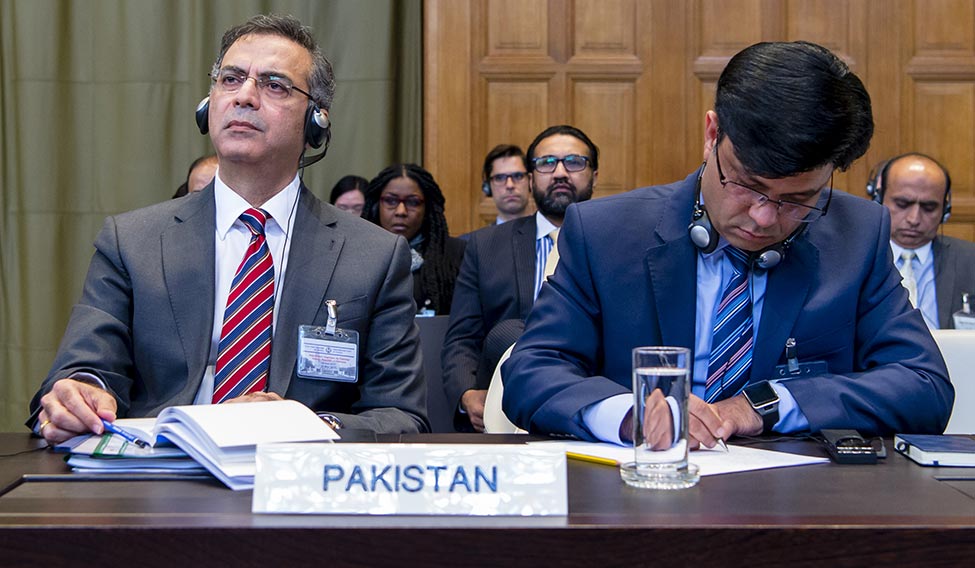As Pakistan prepares for the next hearing at the International Court of Justice in the Kulbhushan Jadhav case, it faces immense pressure at home. The perception is that its legal team was ill-prepared at the opening hearing of the case. The Pakistan government is facing widespread criticism following the ICJ’s stay of Jadhav’s execution. It is being grilled over the legal team’s failure to utilise the full 90 minutes allotted for arguments, and for not nominating an ad hoc judge to the court, even as India savoured a legal and diplomatic victory at The Hague.
Speaking to media representatives in Islamabad, Sartaj Aziz, the Pakistan prime minister’s adviser on foreign affairs, however, said the ICJ did not make any pronouncements in the case on the issues of merit and jurisdiction. “The ICJ has only asked Pakistan to keep a stay on Jadhav’s execution until it arrives at a decision,” he said. Responding to questions about the legal team representing Pakistan, Aziz said Pakistan had “only five days to prepare for the appearance… the decision to send Khawar Qureshi [the lawyer who represented Pakistan at the ICJ] was a unanimous one.”
Pakistan is thinking of expanding its legal team, and plans to approach more distinguished lawyers to fight the case at the ICJ. The decision was made after a meeting the government had organised to brief members of the parliament about the progress of the case. Ashtar Ausaf Ali, the attorney general of Pakistan, and Tehmina Janjua, the foreign secretary, spoke to parliamentarians at length about what happened at the ICJ and the likely future course of action. Opposition leaders, however, appeared unconvinced.
Sherry Rehman, former ambassador to the United States and a member of the opposition Pakistan Peoples Party, tweeted that she was not satisfied by the poor preparation of the officials at the briefing and the opacity they displayed. Ghulam Ahmed Bilour, a PPP member of parliament, told THE WEEK that even the government did not seem to have much information about the case. “They were not forthcoming, and it seemed they were not even aware of the details of the case,” he said.
A possible reason why the government is not being able to defend itself even within the country is that the army has not been forthcoming about the details of the case. Reports suggest that the army’s information sharing with the foreign office has been kept to a minimum, creating hurdles for the legal team at the ICJ. “The government should push the military to share more on why consular access was not given to Jadhav. India is making this into a humanitarian issue,” said Bilour.
Initially, when Pakistan was informed of India’s decision to go to the ICJ, policy makers and politicians were happy that India was internationalising the issue. “This will be an opportunity for Pakistan to tell the world through the ICJ that India is involved in state-sponsored terrorism in Pakistan,” said a foreign office representative on conditions of anonymity, prior to the hearing. But given how the case panned out, the government appears worried now and has been trying to create a consensus at home to put up a “strong, robust response” .
Further aggravating the situation, a petition has been filed in the supreme court of Pakistan demanding the immediate execution of Jadhav. The petition was filed on May 27 by PPP leader Farooq Naek, a former chairman of the Pakistan senate, on behalf of Muzamil Ali, a lawyer. It asked the court to declare that Jadhav’s trial had been conducted in accordance with the law, following due process.
Pakistan, however, is unlikely to antagonise the ICJ by disobeying its orders. Ausaf Ali said Pakistan had enough evidence to show that Jadhav was a spy and the ICJ’s interim order on May 18 was just a procedural one. “The evidence would be presented before the ICJ once it resumes the hearing,” said Ali. The Pakistan foreign office said Jadhav was still being interrogated in custody and was providing crucial intelligence inputs. “Jadhav continues to provide crucial intelligence with regard to recent terrorist attacks in Pakistan,” said Nafees Zakaria, spokesperson for the foreign office.
The Pakistan legal team had another round of extensive meetings in Islamabad on May 30 to chart its strategy for the upcoming hearing at The Hague. Qureshi met Aziz, Janjua, and Ausaf Ali in an attempt to beef up Pakistan’s case. “Jadhav is going nowhere,” said Qureshi after the meetings. “The ICJ will never acquit him. We have a solid case of terrorism against him.”







